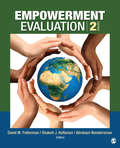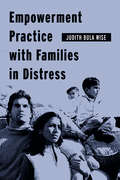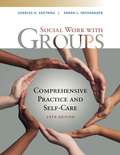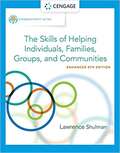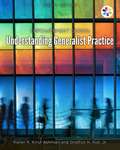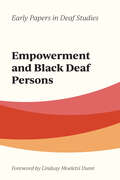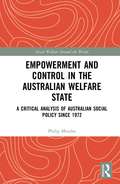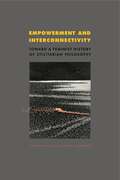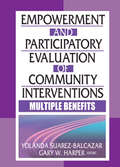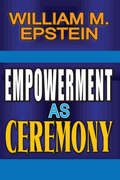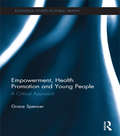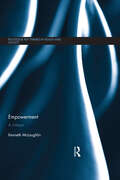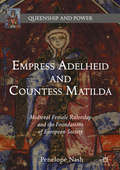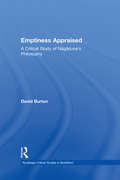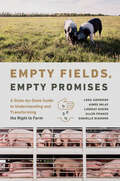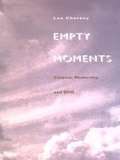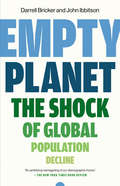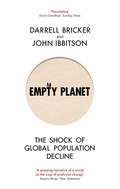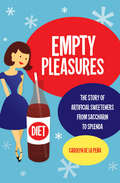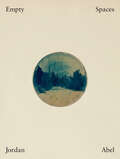- Table View
- List View
Empowerment Evaluation: Knowledge and Tools for Self-Assessment, Evaluation Capacity Building, and Accountability
by Dr David Fetterman Mr Shakeh J. Kaftarian Dr Abraham WandersmanThis Second Edition celebrates 21 years of the practice of empowerment evaluation, a term first coined by David Fetterman during his presidential address for the American Evaluation Association. Since that time, this approach has altered the landscape of evaluation and has spread to a wide range of settings in more than 16 countries. In this Second Edition of Empowerment Evaluation: Knowledge and Tools for Self-Assessment, Evaluation Capacity Building, and Accountability, an outstanding group of evaluators from academia, government, nonprofits, and foundations assess how empowerment evaluation has been used in practice since the publication of the landmark 1996 edition. The book includes 10 empowerment evaluation principles, a number of models and tools to help put empowerment evaluation into practice, reflections on the history and future of the approach, and illustrative case studies from a number of different projects in a variety of diverse settings. The Second Edition offers readers the most current insights into the practice of this stakeholder-involvement approach to evaluation. “One of the greatest evaluation innovations of the past two decades has been the development of a professional and systematic approach to self-evaluation called empowerment evaluation. This book offers you the latest, cutting-edge understanding of this powerful innovation and evaluation approach. May you be inspired and empowered as you adventure through the chapters in this outstanding volume!” —Stewart I. Donaldson, President-elect, American Evaluation Association, Claremont Graduate University “This twenty year follow-up to the original provides even better and richer stories about the versatility and utility of empowerment work in most social contexts. It expands our understanding of how empowerment evaluation is foundational to any effort to improve and measure growth in any community/social environment.” —Robert Schumer, University of Minnesota “This text brings empowerment evaluation to life, and in doing so it offers all evaluators a large body of relevant concepts and tools for designing, implementing, and assessing evaluation efforts that engage, democratize, and strengthen stakeholder’s self-determination.” —Gary J. Skolits, The University of Tennessee, Knoxville
Empowerment Evaluation: Knowledge and Tools for Self-Assessment, Evaluation Capacity Building, and Accountability
by Dr David Fetterman Mr Shakeh J. Kaftarian Dr Abraham WandersmanThis Second Edition celebrates 21 years of the practice of empowerment evaluation, a term first coined by David Fetterman during his presidential address for the American Evaluation Association. Since that time, this approach has altered the landscape of evaluation and has spread to a wide range of settings in more than 16 countries. In this Second Edition of Empowerment Evaluation: Knowledge and Tools for Self-Assessment, Evaluation Capacity Building, and Accountability, an outstanding group of evaluators from academia, government, nonprofits, and foundations assess how empowerment evaluation has been used in practice since the publication of the landmark 1996 edition. The book includes 10 empowerment evaluation principles, a number of models and tools to help put empowerment evaluation into practice, reflections on the history and future of the approach, and illustrative case studies from a number of different projects in a variety of diverse settings. The Second Edition offers readers the most current insights into the practice of this stakeholder-involvement approach to evaluation. “One of the greatest evaluation innovations of the past two decades has been the development of a professional and systematic approach to self-evaluation called empowerment evaluation. This book offers you the latest, cutting-edge understanding of this powerful innovation and evaluation approach. May you be inspired and empowered as you adventure through the chapters in this outstanding volume!” —Stewart I. Donaldson, President-elect, American Evaluation Association, Claremont Graduate University “This twenty year follow-up to the original provides even better and richer stories about the versatility and utility of empowerment work in most social contexts. It expands our understanding of how empowerment evaluation is foundational to any effort to improve and measure growth in any community/social environment.” —Robert Schumer, University of Minnesota “This text brings empowerment evaluation to life, and in doing so it offers all evaluators a large body of relevant concepts and tools for designing, implementing, and assessing evaluation efforts that engage, democratize, and strengthen stakeholder’s self-determination.” —Gary J. Skolits, The University of Tennessee, Knoxville
Empowerment Practice with Families in Distress
by Wise Judith BulaThis book integrates time-honored approaches to empowerment practice with today's more modest goals, mindful of what empowerment can and cannot do. Synthesizing several theoretical supports--the strengths perspective, system theory, theories of family well-being, and theories of coping--the author responds to the question "What works?" with today's families in need. Practice illustrations are provided throughout.
Empowerment Practice with Families in Distress (Empowering the Powerless: A Social Work Series)
by Judith Bula WiseFor more than 150 years, empowering practices have been used by social workers in their work with families, but the techniques of today differ significantly from those of the pioneers or even from those of a few years ago. Today's practitioners recognize that empowering others is impossible; social workers can, however, assist others as they empower themselves. This book integrates time-honored approaches with today's more modest goals, mindful of what empowerment can and cannot do. Synthesizing several theoretical supports—the strengths perspective, system theory, theories of family well-being, and theories of coping—the author responds to the question "What works?" with today's families in need. Practice illustrations are provided throughout to bring concepts to life and, more important, to present families describing their own experiences with achieving empowerment.
Empowerment Series: A Comprehensive Worktext
by Charles Zastrow Sarah L. HessenauerUsing a plentiful selection of skill-building and self-evaluation exercises, Zastrow and Hessenauer's workbook-style text promotes the philosophy that students learn group leadership skills best by practicing them in class. <P><P>In SOCIAL WORK WITH GROUPS, 10th Edition, the authors discuss topics that are central to understanding group leadership: stages of groups, group dynamics, verbal and nonverbal communication, types of groups, and diversity in groups. <P><P>They also focus on helping students acquire the competencies and practice behaviors of the 2015 EPAS. With support from this book, your classroom becomes a lab where students can experience what it's like to work in and lead many kinds of groups. <P><P>Updated throughout with timely new topics and firsthand accounts from experienced social group work professionals, this edition also emphasizes the importance of social workers' self-care. .
Empowerment Series: The Skills of Helping Individuals, Families, Groups, and Communities, Enhanced
by Lawrence ShulmanShulman's text introduces a model for the helping process based on an "interactional" approach, which uses a variety of theories and skills to build on the client-helper relationship. By presenting the core processes and skills in the chapters on work with individuals, Shulman shows how common elements exist across stages of helping and across different populations. These processes and skills reappear in the discussions of group, family, and community work.
Empowerment Series: Understanding Generalist Practice
by Karen K. Kirst-Ashman Grafton H. Hull<P>Organized around the authors' coherent and cohesive Generalist Intervention Model, this introductory guide to generalist social work practice gives your students the knowledge and skills they need to work with individuals and families and the foundation knowledge from a generalist perspective to work with groups, communities, and organizations.<P> This edition continues to emphasize the interrelationship between the micro, mezzo, and macro levels of social work practice; and it reflects the latest Educational Policy and Accreditation Standards with empowerment and strengths perspectives for partnering with clients.
Empowerment and Black Deaf Persons (Early Papers in Deaf Studies #1)
by Lindsay Moeletsi DunnEmpowerment and Black Deaf Persons is a collection of papers from a 1990 conference that brought together an audience of mostly Black Deaf and hearing people to address three themes: leadership and advocacy, the dynamics and dilemmas of being multiply marginalized, and issues related to language and community. Scholars, students, and community members will find this volume invaluable for understanding the origins and evolution of Black Deaf Studies. Lindsay Dunn, co-chair of the original conference, contributes a new foreword, offering contemporary insights and reflections. This is the inaugural volume in the Early Papers in Deaf Studies series, which will consist of reissued works originally published by the Gallaudet University College for Continuing Education but long out of print. The aim of this series is to restore these foundational papers to the scholarly community. Empowerment and Black Deaf Persons is available in both print and open digital formats, ensuring broad access to this important contribution to the literature.
Empowerment and Control in the Australian Welfare State: A Critical Analysis of Australian Social Policy Since 1972 (Social Welfare Around the World)
by Philip MendesThis book explores the tensions between the competing social rights and social control functions of the modern Australian welfare state. By critically examining the history and rhetoric of the Australian welfare state from 1972 to the present day, and using the author’s long-standing research on the Australian Council of Social Service and other welfare advocacy groups, it analyses the transformation from rights-based to conditional welfare. The Labor Party Government from 1972-75 is identified as the only clear cut example of Australia positively using welfare payments and services as an instrument to promote greater social equity, inclusion and participation. Since the mid-1970s, the Australian welfare state has gradually retreated from the social rights agenda conceived by the Whitlam Government. Australia has followed other Anglo-Saxon countries in adopting increasingly conditional and paternalistic measures that undermine the protection of social citizenship outside the labour market. In contrast, this text makes the case for an alternative participatory and decentralized welfare state model that would prioritize social care by empowering and supporting welfare service users at a local community level. This book will be of interest to academics, students and policy-makers working within social policy, social work and political sociology.
Empowerment and Interconnectivity: Toward a Feminist History of Utilitarian Philosophy
by Catherine Villanueva GardnerFeminist history of philosophy has successfully focused thus far on canon revision, canon critique, and the recovery of neglected or forgotten women philosophers. However, the methodology remains underexplored, and it seems timely to ask larger questions about how the history of philosophy is to be done and whether there is, or needs to be, a specifically feminist approach to the history of philosophy. In Empowerment and Interconnectivity, Catherine Gardner examines the philosophy of three neglected women philosophers, Catharine Beecher, Frances Wright, and Anna Doyle Wheeler, all of whom were British or American utilitarian philosophers of one stripe or another. Gardner’s focus in this book is less on accounting for the neglect or disappearance of these women philosophers and more on those methodological (or epistemological) questions we need to ask in order to recover their philosophy and categorize it as feminist.
Empowerment and Interconnectivity: Toward a Feminist History of Utilitarian Philosophy
by Catherine Villanueva GardnerFeminist history of philosophy has successfully focused thus far on canon revision, canon critique, and the recovery of neglected or forgotten women philosophers. However, the methodology remains underexplored, and it seems timely to ask larger questions about how the history of philosophy is to be done and whether there is, or needs to be, a specifically feminist approach to the history of philosophy. In Empowerment and Interconnectivity, Catherine Gardner examines the philosophy of three neglected women philosophers, Catharine Beecher, Frances Wright, and Anna Doyle Wheeler, all of whom were British or American utilitarian philosophers of one stripe or another. Gardner’s focus in this book is less on accounting for the neglect or disappearance of these women philosophers and more on those methodological (or epistemological) questions we need to ask in order to recover their philosophy and categorize it as feminist.
Empowerment and Participatory Evaluation of Community Interventions: Multiple Benefits
by Gary Harper Yolanda Suarez-BalcazarProgram evaluations are more relevant when conducted by the people directly involved in the programs and members of the communities they serve. Learn how empowerment and participatory evaluation can help community programs deliver more effective services! With this book, you&’ll examine theoretical models, empirical investigations, and case studies that highlight important aspects of empowerment and participatory evaluation in community programs. The first half of the book presents frameworks and tools for empowerment and participatory evaluation, with an emphasis on transferring skills and building capacity. The remaining chapters examine specific efforts to implement empowerment and participatory evaluation with a range of stakeholders, highlighting the ways in which community members collaborated with evaluators and were actively engaged in the evaluation process. Covering various types of evaluations across a range of urgent social issues, this book offers practical steps for implementing evaluations and presents theoretical models as well as applied examples. The issues that Empowerment and Participatory Evaluation of Community Interventions addresses include: challenges faced by community-based organizations in conducting evaluations of their initiatives-and solutions to those challenges, including the creation and implementation of an appropriate outcomes model ways to build capacity for participatory evaluation within community initiatives ways to promote the success and accountability of community programs how collaborative process evaluation can improve HIV prevention services evaluation techniques that illustrate the benefits of a collaborative approach-with a case study of the Conflict Resolution in Schools Programs a pilot study in which empowerment evaluation principles are used to evaluate the American Red Cross of Greater Chicago&’s Youth Leadership Training Series (a program designed to train youth volunteers) Presenting important information on program evaluation, community-based interventions and community empowerment, empowerment/participatory evaluation, community psychology, collaborative partnerships, program improvement, utilization-focused evaluation, consultation, and more, Empowerment and Participatory Evaluation of Community Interventions is a resource that everyone involved in community psychology should have!
Empowerment as Ceremony
by William EpsteinMany people in the United States are poor, lead marginal lives, and need jobs as well as basic services such as education, medical care, and housing. Multitudes in other parts of the world, in addition to being poor, are jailed, tortured, and killed for being members of the wrong ethnic group or expressing political opinions. Those who argue for empowerment claim it is a magic bullet. It can liberate the oppressed, largely through self-organization, self-motivation, self-invention, and even self-clarity.William M. Epstein sees contemporary empowerment practice in the United States as a civic church of national values, one better in performing its ceremonial role than god-based houses of worship. By itself, empowerment is not worth the effort of commentary, since it achieves none of its goals and has not even generated a respectable critical literature. But Epstein argues that empowerment practice and American social welfare both embody prescriptive cultural preferences. Like art and music, empowerment opens windows into deeper social meaning.The social sciences have carved out roles for themselves by looking for simple remedies, ones that are inexpensive and compatible with contemporary social arrangements. Epstein shows that those in social work practices have not only deluded themselves into thinking that these services have real instrumental value, but really operate at cross-purposes. This accessible work will attract critical attention among these professional groups. It bases its carefully-documented insights upon informed sociological and anthropological theory.
Empowerment, Health Promotion and Young People: A Critical Approach
by Grace SpencerGlobally, young people’s health is an increasing priority area for health practitioners, policy-makers and researchers, and concepts of empowerment feature strongly in international public health discourses on young people’s health. Yet the concept of empowerment remains under-theorized, and its relationship to young people’s health is not well understood. This innovative volume critically examines the concept of empowerment and its relationship to young people’s health. Empowerment, Health Promotion and Young People is set out in two main parts. Part one examines differing conceptions of power and empowerment and how these concepts have been variously defined and used in relation to young people’s health and health promotion. Part two offers a new theoretical framework for understanding empowerment as it relates to young people’s health. Drawing together key works in the field and findings from an empirical enquiry on young people’s health, this framework looks at health as it is defined by young people themselves, and offers new directions for empowerment, and critical insights into the field of young people’s health and health promotion. Critically engaging with the concept of power and opening up the debate about the relevance and effectiveness of using contemporary understandings of empowerment to promote health, this book is suitable for researchers and students of health, sociology, education and youth studies interested in young people’s health and health promotion.
Empowerment: A Critique (Routledge Key Themes in Health and Society)
by Kenneth McLaughlin‘Empowerment’ is a term in widespread use today and one that is often considered to be a self-evident good. Here, McLaughlin explores its emergence in the 1960s through to its rise in the 1990s and ubiquity in present day discourse and interrogates its social status, paying particular attention to social policy, social work and health and social care discourse. He argues that a focus on empowerment has superseded the notion of political subjects exercising power autonomously. This innovative volume: - Discusses the relationship between concepts of empowerment and power, as they have been understood historically. - Analyses changes in the conception and meaning of empowerment in relation to the shifting social and political landscape. - Acknowledges the positive impact empowerment strategies have had on those who have campaigned to be empowered and also on those who have saw their role as being to help empower others. - Highlights ways in which talk about empowerment can actually work in such a way as to further disempower those already marginalised. Critically examining how ‘empowerment’ has become embedded in contemporary social and political life, this work offers a discussion of the term’s multiple meanings, what it actually entails, and how it constructs and positions those being empowered and those empowering.
Empress Adelheid and Countess Matilda: Medieval Female Rulership and the Foundations of European Society (Queenship and Power)
by Penelope NashThis book compares two successful, elite women, Empress Adelheid (931-999) and Countess Matilda (1046-1115), for their relative ability to retain their wealth and power in the midst of the profound social changes of the eleventh century. The careers of the Ottonian queen and empress Adelheid and Countess Matilda of Tuscany reveal a growth of opportunities for women to access wealth and power. These two women are analyzed under three categories: their relationships with family and friends, how they managed their property (particularly land), and how they ruled. This analysis encourages a better understanding of gender relations in both the past and the present.
Emptiness Appraised: A Critical Study of Nagarjuna's Philosophy (Routledge Critical Studies in Buddhism #No.11)
by David F. BurtonEmptiness means that all entities are empty of, or lack, inherent existence - entities have a merely conceptual, constructed existence. Though Nagarjuna advocates the Middle Way, his philosophy of emptiness nevertheless entails nihilism, and his critiques of the Nyaya theory of knowledge are shown to be unconvincing.
Empty Fields, Empty Promises: A State-by-State Guide to Understanding and Transforming the Right to Farm (Rural Studies Series)
by Loka Ashwood Danielle Diamond Allen Franco Aimee Imlay Lindsay KuehnThe right to farm is essential to everyone's survival. Since the late 1970s, states across the nation have adopted so-called right-to-farm laws to limit nuisance suits loosely related to agriculture. But since their adoption, there has yet to be a comprehensive analysis of what these laws do and who they benefit. This book offers the first national analysis and guide to these laws. It reveals that they generally benefit the largest operators, like processing plants, while traditional farmers benefit the least. Disfavored most of all are those seeking to defend their homes and environment against multinational corporations that use right-to-farm laws to strip neighboring owners of their property rights. Through what the book calls the "midburden," right-to-farm laws dispossess the many in favor of the few, paving the path to rural poverty. Empty Fields, Empty Promises summarizes every state's right-to-farm laws to help readers track and navigate their local and regional legal landscape. The book concludes by offering paths forward for a more distributed and democratic agrifood system that achieves agricultural, rural, and environmental justice.
Empty Moments: Cinema, Modernity, and Drift
by Leo CharneyIn Empty Moments, Leo Charney describes the defining quality of modernity as "drift"--the experience of being unable to locate a stable sense of the present. Through an exploration of artistic, philosophical, and scientific interrogations of the experience of time, Charney presents cinema as the emblem of modern culture's preoccupation with the reproduction of the present. Empty Moments creates a catalytic dialogue among those who, at the time of the invention of film, attempted to define the experience of the fleeting present. Interspersing philosophical discussions with stylistically innovative prose, Charney mingles Proust's conception of time/memory with Cubism's attempt to interpret time through perspective and Surrealism's exploration of subliminal representations of the present. Other topics include Husserl's insistence that the present can only be fantasy or fabrication and the focus on impossibility, imperfection, and loss in Kelvin's laws of thermodynamics. Ultimately, Charney's work hints at parallels among such examples, the advent and popularity of cinema, and early film theory. A book with a structural modernity of its own, Empty Moments will appeal to those interested in cinema and its history, as well as to other historians, philosophers, literary, and cultural scholars of modernity.
Empty Planet: The Shock of Global Population Decline
by John Ibbitson Darrell BrickerAn award-winning journalist and leading international social researcher make the provocative argument that the global population will soon begin to decline, dramatically reshaping the social, political, and economic landscape For half a century, statisticians, pundits, and politicians have warned that a burgeoning population will soon overwhelm the earth's resources. But a growing number of experts are sounding a different alarm. Rather than continuing to increase exponentially, they argue, the global population is headed for a steep decline—and in many countries, that decline has already begun. In Empty Planet, John Ibbitson and Darrell Bricker find that a smaller global population will bring with it many benefits: fewer workers will command higher wages; the environment will improve; the risk of famine will wane; and falling birthrates in the developing world will bring greater affluence and autonomy for women. But enormous disruption lies ahead, too. We can already see the effects in Europe and parts of Asia, as aging populations and worker shortages weaken the economy and impose crippling demands on healthcare and social security. The United States and Canada are well-positioned to successfully navigate these coming demographic shifts--that is, unless growing isolationism leads us to close ourselves off just as openness becomes more critical to our survival than ever. Rigorously researched and deeply compelling, Empty Planet offers a vision of a future that we can no longer prevent--but one that we can shape, if we choose.
Empty Planet: The Shock of Global Population Decline
by John Ibbitson Darrell Bricker**A SUNDAY TIMES MUST-READ**'Riveting and vitally important' - Steven Pinker'A gripping narrative of a world on the cusp of profound change' - Anjana Ahuja, New StatesmanEmpty Planet offers a radical, provocative argument that the global population will soon begin to decline, dramatically reshaping the social, political and economic landscape.For half a century, statisticians, pundits and politicians have warned that a burgeoning planetary population will soon overwhelm the earth's resources. But a growing number of experts are sounding a different kind of alarm. Rather than growing exponentially, they argue, the global population is headed for a steep decline. Throughout history, depopulation was the product of catastrophe: ice ages, plagues, the collapse of civilizations. This time, however, we're thinning ourselves deliberately, by choosing to have fewer babies than we need to replace ourselves. In much of the developed and developing world, that decline is already underway, as urbanisation, women's empowerment, and waning religiosity lead to smaller and smaller families. In Empty Planet, Ibbitson and Bricker travel from South Florida to Sao Paulo, Seoul to Nairobi, Brussels to Delhi to Beijing, drawing on a wealth of research and firsthand reporting to illustrate the dramatic consequences of this population decline - and to show us why the rest of the developing world will soon join in. They find that a smaller global population will bring with it a number of benefits: fewer workers will command higher wages; good jobs will prompt innovation; the environment will improve; the risk of famine will wane; and falling birthrates in the developing world will bring greater affluence and autonomy for women. But enormous disruption lies ahead, too. We can already see the effects in Europe and parts of Asia, as aging populations and worker shortages weaken the economy and impose crippling demands on healthcare and vital social services. There may be earth-shaking implications on a geopolitical scale as well. Empty Planet is a hugely important book for our times. Captivating and persuasive, it is a story about urbanisation, access to education and the empowerment of women to choose their own destinies. It is about the secularisation of societies and the vital role that immigration has to play in our futures.Rigorously researched and deeply compelling, Empty Planet offers a vision of a future that we can no longer prevent - but that we can shape, if we choose to.
Empty Planet: The Shock of Global Population Decline
by John Ibbitson Darrell Bricker**A SUNDAY TIMES MUST-READ**'Riveting and vitally important' - Steven Pinker'A gripping narrative of a world on the cusp of profound change' - Anjana Ahuja, New StatesmanEmpty Planet offers a radical, provocative argument that the global population will soon begin to decline, dramatically reshaping the social, political and economic landscape.For half a century, statisticians, pundits and politicians have warned that a burgeoning planetary population will soon overwhelm the earth's resources. But a growing number of experts are sounding a different kind of alarm. Rather than growing exponentially, they argue, the global population is headed for a steep decline. Throughout history, depopulation was the product of catastrophe: ice ages, plagues, the collapse of civilizations. This time, however, we're thinning ourselves deliberately, by choosing to have fewer babies than we need to replace ourselves. In much of the developed and developing world, that decline is already underway, as urbanisation, women's empowerment, and waning religiosity lead to smaller and smaller families. In Empty Planet, Ibbitson and Bricker travel from South Florida to Sao Paulo, Seoul to Nairobi, Brussels to Delhi to Beijing, drawing on a wealth of research and firsthand reporting to illustrate the dramatic consequences of this population decline - and to show us why the rest of the developing world will soon join in. They find that a smaller global population will bring with it a number of benefits: fewer workers will command higher wages; good jobs will prompt innovation; the environment will improve; the risk of famine will wane; and falling birthrates in the developing world will bring greater affluence and autonomy for women. But enormous disruption lies ahead, too. We can already see the effects in Europe and parts of Asia, as aging populations and worker shortages weaken the economy and impose crippling demands on healthcare and vital social services. There may be earth-shaking implications on a geopolitical scale as well. Empty Planet is a hugely important book for our times. Captivating and persuasive, it is a story about urbanisation, access to education and the empowerment of women to choose their own destinies. It is about the secularisation of societies and the vital role that immigration has to play in our futures.Rigorously researched and deeply compelling, Empty Planet offers a vision of a future that we can no longer prevent - but that we can shape, if we choose to.
Empty Planet: The Shock of Global Population Decline
by John Ibbitson Darrell BrickerFrom the authors of the bestselling The Big Shift, a provocative argument that the global population will soon begin to decline, dramatically reshaping the social, political, and economic landscape. For half a century, statisticians, pundits, and politicians have warned that a burgeoning planetary population will soon overwhelm the earth's resources. But a growing number of experts are sounding a different kind of alarm. Rather than growing exponentially, they argue, the global population is headed for a steep decline. Throughout history, depopulation was the product of catastrophe: ice ages, plagues, the collapse of civilizations. This time, however, we're thinning ourselves deliberately, by choosing to have fewer babies than we need to replace ourselves. In much of the developed and developing world, that decline is already underway, as urbanization, women's empowerment, and waning religiosity lead to smaller and smaller families. In Empty Planet, Ibbitson and Bricker travel from South Florida to Sao Paulo, Seoul to Nairobi, Brussels to Delhi to Beijing, drawing on a wealth of research and firsthand reporting to illustrate the dramatic consequences of this population decline--and to show us why the rest of the developing world will soon join in. They find that a smaller global population will bring with it a number of benefits: fewer workers will command higher wages; good jobs will prompt innovation; the environment will improve; the risk of famine will wane; and falling birthrates in the developing world will bring greater affluence and autonomy for women. But enormous disruption lies ahead, too. We can already see the effects in Europe and parts of Asia, as aging populations and worker shortages weaken the economy and impose crippling demands on healthcare and social security. The United States is well-positioned to successfully navigate these coming demographic shifts--that is, unless growing isolationism and anti-immigrant backlash lead us to close ourselves off just as openness becomes more critical to our survival than ever before. Rigorously researched and deeply compelling, Empty Planet offers a vision of a future that we can no longer prevent--but one that we can shape, if we choose.
Empty Pleasures: The Story of Artificial Sweeteners from Saccharin to Splenda
by Carolyn De La PeñaSugar substitutes have been a part of American life since saccharin was introduced at the 1893 World's Fair. In Empty Pleasures, the first history of artificial sweeteners in the United States, Carolyn de la PeÑa blends popular culture with business and women's history, examining the invention, production, marketing, regulation, and consumption of sugar substitutes such as saccharin, Sucaryl, NutraSweet, and Splenda. She describes how saccharin, an accidental laboratory by-product, was transformed from a perceived adulterant into a healthy ingredient. As food producers and pharmaceutical companies worked together to create diet products, savvy women's magazine writers and editors promoted artificially sweetened foods as ideal, modern weight-loss aids, and early diet-plan entrepreneurs built menus and fortunes around pleasurable dieting made possible by artificial sweeteners. NutraSweet, Splenda, and their predecessors have enjoyed enormous success by promising that Americans, especially women, can "have their cake and eat it too," but Empty Pleasures argues that these "sweet cheats" have fostered troubling and unsustainable eating habits and that the promises of artificial sweeteners are ultimately too good to be true.
Empty Spaces
by Jordan AbelA hypnotic and mystifying exploration of land and legacy, investigating what it means to be an intergenerational, Indigenous survivor of Residential Schools Jordan Abel&’s new work grows out of the groundbreaking visual expression in his recently published NISHGA, a book that combined nonfiction with photography, concrete poetry, and literary inquiry. Whereas NISHGA integrated descriptions of the landscape from James Fenimore Cooper&’s settler classic The Last of the Mohicans into visual pieces, Empty Spaces reinscribes those words on the page itself, and in doing so subjects them to bold rewritings. Reimagining the nineteenth-century text from the contemporary perspective of an urban Nisga&’a person whose relationship to land and traditional knowledge and spiritual traditions was severed by colonial violence, Abel attempts to answer his research question of what it means to be Indigenous without access to familial territory. Engaging the land through fiction and metaphor, Abel creates an eerie, looping, and atmospheric rendering of place that evolves despite the violent and reckless histories of North America. The result is a bold and profound new vision of history that decenters human perception and forgoes Westernized ways of seeing. Rather than turning to characters and dialogue to explore truth, Abel invites us to instead understand that the land knows everything that can and will happen, even as the world lurches toward uncertainty.
